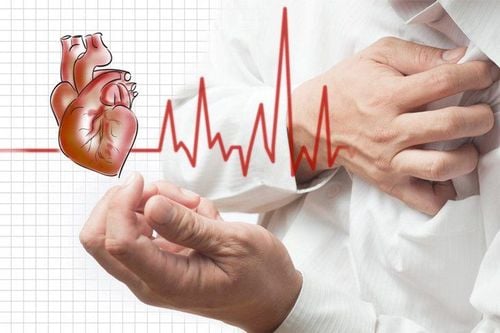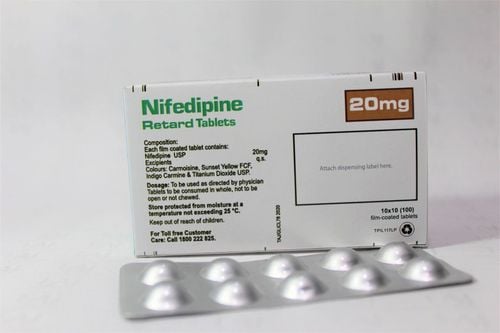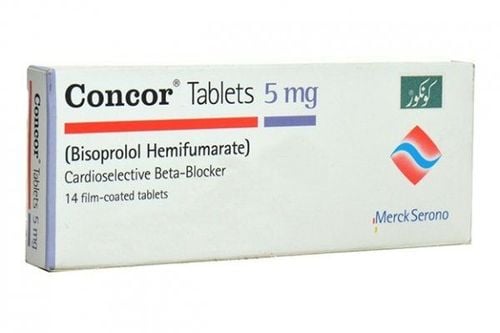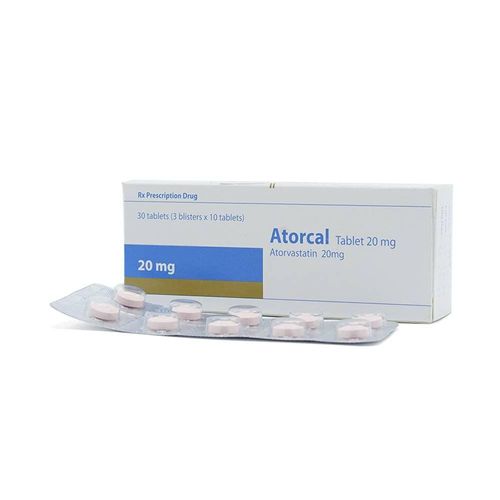This is an automatically translated article.
To control coronary heart disease, patients need lifestyle changes, coronary medications and surgery on a case-by-case basis. The process of monitoring the disease requires close coordination with a cardiologist. So what drugs do people with coronary artery disease take and what other options are there?
1. Drugs and indications for treatment of coronary heart disease
In response to the question of what drugs to take for coronary heart disease, doctors say there are many types of drugs used to treat coronary artery disease, including:
Cholesterol-modifying drugs: These drugs reduce (or modify) ) deposits on the coronary arteries. As a result, cholesterol levels will drop, especially low-density lipoprotein (LDL), otherwise known as “bad” cholesterol. Your doctor may choose from a variety of coronary medications in this class, including statins, niacin, fibrates, and bile acid sequestrants. Aspirin: Your doctor may recommend that you take daily aspirin or other blood-thinning medications. This class of coronary drugs can reduce blood clotting, thereby preventing blockage of the coronary arteries. If you have had a heart attack, aspirin can prevent recurrent attacks. But aspirin can be dangerous for someone with a bleeding disorder or who is taking another blood thinner, so check with your doctor before taking it. Beta-blockers: These drugs slow the heart rate and lower blood pressure, as well as reduce the heart's need for oxygen. If you have a history of heart attack, beta-blockers also reduce your risk of future heart failure. Calcium blockers: These coronary drugs may be used in combination with beta-blockers when they are ineffective alone, or as an alternative if beta-blockers are contraindicated. This class of drugs helps improve symptoms of chest pain. Ranolazine: May help people with angina, prescribed alongside a beta-blocker or as an alternative to a beta-blocker if you can't take it. Nitroglycerin: Nitroglycerin tablets, sprays, and patches can control chest pain by temporarily dilating coronary arteries and reducing the heart's need for blood. ACE inhibitors and angiotensin II receptor blockers (ARBs): Similar coronary heart disease medications like these lower blood pressure and prevent the progression of coronary heart disease.
2. Alternative medicine options in the treatment of coronary heart disease
In general, treatment for coronary artery disease usually includes lifestyle changes, medication, and some medical procedures only when absolutely necessary.
2.1. Lifestyle change
Making the following healthy lifestyle changes can promote healthier arteries:
Quit smoking : Smoking is a major risk factor for coronary heart disease. Nicotine constricts blood vessels and forces the heart to work harder, while carbon monoxide (CO) reduces the amount of oxygen in the blood and damages the lining of blood vessels. Quitting smoking is one of the best ways to reduce the risk of heart attack in smokers. Choose heart-healthy foods: Eat plenty of fruits, vegetables, whole grains, legumes, and nuts. Avoid saturated and trans fats, and reduce salt and sugar. Eating 1-2 servings of fish a week can also keep your heart healthy. MORE: Heart-healthy diet: 8 steps to prevent heart disease
Regular exercise : Exercise helps control weight, diabetes, high cholesterol and high blood pressure - all factors risk of coronary heart disease. Get at least 150 minutes of moderate-intensity aerobic exercise or 75 minutes of vigorous-intensity exercise each week, or a combination of both moderate and vigorous activity. Maintain a healthy weight: Being overweight increases the risk of coronary heart disease. Even losing a little extra weight can reduce risk factors for coronary heart disease. Reduce stress: Limit stress, practice healthy techniques to manage stress, such as muscle relaxation and deep breathing.
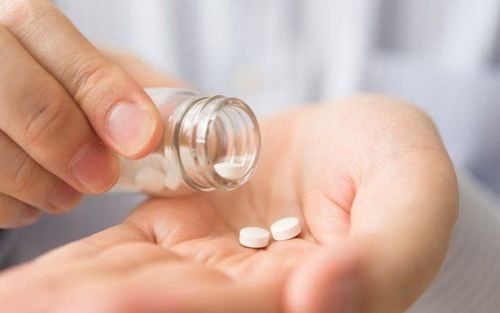
Sử dụng thuốc điều trị bệnh mạch vành
2.2. Process of restoring and improving blood flow
Procedures to restore and improve blood flow, sometimes requiring more aggressive treatment with techniques:
Angioplasty and stenting (percutaneous coronary revascularization) The doctor inserts a long, thin catheter (catheter) ) into the narrowed artery. A wire with an air balloon is passed through the catheter to the narrowed area. The balloon is then inflated, compressing the debris against the artery wall. A stent is usually left inside and the drug is released slowly to keep the artery open.
Coronary artery bypass surgery The surgeon will use a vessel from another part of the body to bypass blocked coronary arteries. This technique allows blood to flow around a blocked or narrowed coronary artery, which is often indicated for patients with multiple narrowed coronary arteries.
2.3. Home Remedies
To prevent or slow the progression of the disease, in addition to taking coronary medications, you should also:
Control your blood pressure: Ask your doctor to measure your blood pressure at least every 2 years. You should measure more often if your blood pressure is higher than normal or if you have a history of heart disease. Optimal blood pressure is less than 120 mmHg diastolic and 80 mmHg systolic. Cholesterol screening: People 20 years of age and older should have a baseline cholesterol test at least every 5 years. Most people should aim for an LDL cholesterol level of less than 130 mg/dL (3.4 mmol/L). If other risk factors for heart disease are present, the target LDL cholesterol may be less than 100 mg/dL (2.6 mmol/L). If the test results are not in the target range, you may need more frequent cholesterol tests. Control your diabetes: If you have diabetes, closely managing your blood sugar can help reduce your risk of heart disease. Avoid or limit alcohol: If it's not possible to avoid it completely, drink alcohol in moderation. Healthy adults should have no more than 1 drink per day for women and 2 drinks per day for men. Cardiac Rehabilitation: If you've had surgery, your doctor may suggest you participate in cardiac rehabilitation - a program of exercise education, counseling and training designed to improve people's health. sick. Flu shot: Get a flu shot every year to reduce your risk of getting the flu. Routine physical examination: Some of the main risk factors for coronary heart disease, such as high cholesterol, high blood pressure, and diabetes, are often asymptomatic in the early stages. Early detection and treatment can help you maintain better heart health.
2.4. Alternative medicine dose
Omega-3 fatty acids are a type of unsaturated fatty acid that works to reduce inflammation throughout the body, which contributes to coronary heart disease. However, more research is still needed to prove this.Fish and fish oil: The most effective sources of omega-3 fatty acids. Fatty fish, such as salmon, herring and canned tuna, contain the most omega-3 fatty acids, so they provide the most benefits. Fish oil supplements may be beneficial, but not as potent as eating whole fish. Flaxseed and flaxseed oil: Flaxseed and flaxseed oil also contain beneficial omega-3 fatty acids, although not as effectively as fish. Flaxseed hulls also contain soluble fiber, which can avoid constipation. More research is needed to determine if flaxseeds can help lower blood cholesterol. Other dietary sources of omega-3 fatty acids (canola, soybean, and soybean oils): These foods contain small amounts of omega-3 fatty acids, which have benefits for heart health. but not as strong as fish and fish oil. Around what to take for coronary heart disease, the following supplements may also help lower blood pressure or cholesterol levels - two factors that contribute to the disease:
alpha-linolenic acid Barley Cocoa Coenzyme Q10 Fiber , including oat bran found in oatmeal and wholegrain oats Garlic Stanols and plant sterols (found in supplements and some margarines),

Tập thể dục thường xuyên có thể thúc đẩy các động mạch khỏe mạnh hơn
3. Note when using drugs to treat coronary heart disease
When fighting angina - a typical symptom of coronary artery disease with vasodilators, patients may experience some unwanted side effects, such as dizziness, headache, dry cough, constipation.. When having these symptoms, it is necessary to quickly contact a specialist doctor to adjust coronary drugs and find appropriate treatment measures.
In addition, as mentioned, hypertension and diabetes are also leading causes of blood vessel damage, facilitating the formation of plaque. When these conditions are combined with coronary heart disease, they will make the disease worse. Therefore, patients need to take drugs to treat comorbidities and control both blood pressure and blood sugar. Your doctor will prescribe a combination of different drugs and specific dosages depending on each person's health.
Always consult your doctor before adding a new over-the-counter coronary medicine or supplement to your treatment plan. Some drugs and supplements can interact with other drugs, causing side effects or making them less effective. To quickly control the disease and prevent complications, you need to visit and strictly follow the treatment regimen of your doctor.
Vinmec Cardiology Department has always received much praise and satisfaction from domestic and international customers, being pioneers in successfully applying the world's most advanced techniques in the treatment of cardiovascular diseases. .
A team of highly qualified and experienced specialists: qualified doctors from Master's to Professor's and Doctor's degrees, reputable in medical treatment, surgery, interventional cardiac catheterization. Intensive training at home & abroad. In particular, Prof. TS.BS Vo Thanh Nhan - Cardiology Director of Vinmec Central Park was recognized as the first and only expert in Vietnam to be awarded the "Proctor" certificate on TAVI. State-of-the-art equipment, comparable to major hospitals in the world: The most modern operating room in the world; The most modern silent magnetic resonance imaging machine in Southeast Asia; The CT machine has a super-fast scanning speed of only 0.275s/round without the use of drugs to lower the heart rate; The 16-sequence PET/CT and SPECT/CT systems help detect damage to the cardiovascular organs early even when there are no symptoms of the disease. Applying the most advanced intensive cardiovascular techniques in the world in treatment: Painless open-heart surgery; Percutaneous aortic intervention without general anesthesia; Treatment of mitral regurgitation through the catheter has a success rate of 95%; Ventricular-assisted artificial heart transplantation for patients with end-stage heart failure prolongs quality of life beyond 7 years. Cooperating with leading cardiovascular centers in Vietnam and the world such as: National Heart Institute, Cardiology Department of Hanoi Medical University, University of Paris Descartes - Georges Pompidou Hospital (France), University of Pennsylvania (France), University of Pennsylvania (France), University of Pennsylvania (France). United States)... with the aim of updating the most modern cardiovascular treatments in the world. To register for examination and treatment with the leading doctors of the Cardiology Department at Vinmec International General Hospital, please click the "Contact Us" button on the website, or register for an online examination.
Please dial HOTLINE for more information or register for an appointment HERE. Download MyVinmec app to make appointments faster and to manage your bookings easily.
Reference source: mayoclinic.org



